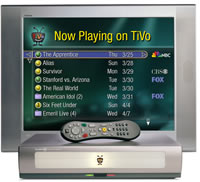 In a long line of articles where TV execs try to ponder how to stop losing sleep and preserve their once comfortable lives, Meg James in the LA Times covers the impact of PVR’s, in particular TiVo, and how the TV industry is still trying to adjust to its impact.
In a long line of articles where TV execs try to ponder how to stop losing sleep and preserve their once comfortable lives, Meg James in the LA Times covers the impact of PVR’s, in particular TiVo, and how the TV industry is still trying to adjust to its impact.
It’s warming to see that there are still articles coming out, with quotes from TiVo users such as, “Once you’ve used one, you can’t imagine life without TiVo,” as Charlie Flint of Marina del Rey, California did. It’s somewhat reassuring that the impact is still as great for new users as it was when TiVo was first introduced.
One thing that doesn’t get mentioned in connection with this, and this is something that TV people should have sympathy with, is that ad breaks, do exactly that, break up the programme. Interrupting its flow.
This has been more than amply proven in the UK where The Simpsons have moved from commercial-free BBC2 to the advertiser-supported Channel 4.
Previously used to watching the show from beginning to end, without interruption. When watching the show, on TiVo of course, the story is interrupted by having to skip through the adverts.
Interestingly the exact opposite of the programmes sponsor desired intention is achieved. I have now come to resent the Pizza chain, as they are associated with interrupting my viewing pleasure.
One of the reasons that articles like this continue to make press is that estimated figures coming out of research houses and banks make worrying reading for the TV, and therefore the entertainment world.
By 2010, half the US households with TV sets are expected also to have digital recorders, according to a recent Smith Barney report. The tipping point could come as early as 2007, the report said, when the television industry may lose as much as $7.6 billion — or about 10% of its annual ad revenue — as advertisers seek other ways of reaching consumers.
A number of alternatives are suggested including pay-per-play, product placement in shows.
In one, viewers would pay $1 to see an episode of a show On Demand, “much as music fans do when they download a song from Apple Computer Inc.’s iTunes music store,” appearing to forget that the iTunes users don’t pay another $1 when they listen to the song the following week, as would be that case with a VOD show.
It’s gratifying that Meg James ends the article with a wise quote from her interviewee, one that the TV industry should be listening to, “I’m now trying stuff that I never would have watched before. I’ll give it a shot and set the TiVo, then watch the show later … when nothing else is on,” TiVo-user Flint said. “I’m watching probably 50% more TV than I used to.